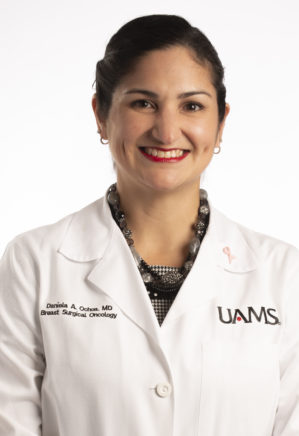
Program Director: Daniela A. Ochoa, M.D., FACS
Program Co-Director: Ronda Henry-Tillman, M.D., FACS
The Fellowship in Diseases of the Breast is housed within the Division of Breast Surgical Oncology in the Winthrop P. Rockefeller Cancer Institute (WPRCI) that is a part of the University of Arkansas for Medical Sciences (UAMS).
Objectives
The overall goal of the Fellowship in Diseases of the Breast at the Winthrop P. Rockefeller Cancer Institute at UAMS is to further the experience of recently trained surgeons who wish to pursue careers in the multi-modality clinical care specific to breast patients and who want additional training in breast cancer research.
Program Design
The Division of Breast Surgical Oncology at University of Arkansas for Medical Sciences offers a one-year Interdisciplinary Breast Surgery Fellowship. The clinical experience will be accomplished over the course of one year; the program can accept two fellows each year. Supplementary experiences will be identified and provided for the special needs of individual fellows with an additional optional research year, if it is desired.
The Breast Program is accredited by the National Accreditation Program for Breast Centers (NAPBC) and the Fellowship Program has been accredited by the Society of Surgical Oncology (SSO) since 1996. The Breast Service consists of two surgical attending physicians, clinical and research nurses, and data managers who have advanced some of the cutting-edge procedures today: intraoperative and subareolar radioisotope injection, Hematoma-directed US-Guided (HUG) intraoperative localization (as an alternative to needle-localization), percutaneous excision of benign tumors, total skin-sparing mastectomy and reconstruction, oncoplastic surgical techniques including symmetrization mammoplasty, axillary reverse mapping (ARM) to prevent lymphedema, and advancement and rotational flaps for tissue coverage of locally advanced disease. The WPRCI is active in cooperative group trials regionally and nationally, and there are also opportunities for community outreach and disparities research. Physicians interested in breast disease must be educated in a multimodal fashion, developing knowledge of benign and malignant conditions. The breast specialist needs to have training in molecular epidemiology, genetics, screening and detection, breast imaging, benign breast disease and breast pain, biostatistics, clinical trial design and analysis, as well as behavioral, medical, surgical, pathological and radiation oncology in order to best serve their community.
Unique to this fellowship is the emphasis on continuous versus fragmented care where the fellow has the opportunity to screen, diagnose, and provide surgical, psycho-social and adjuvant therapy to the same patient in a longitudinal experience.
Clinical Rotations
The basic surgical rotations include benign breast disease and high-risk clinics in which the fellow evaluates patients with family history, prior diagnosis of a high-risk lesion, or genetic variants. The clinic is coupled with an Advanced Practice Registered Nurse (APRN) who assists with the High Risk and Lymphedema Clinics, and research nurses for accruing patients into clinical trials. The fellow will learn to discuss with patients contributing risk factors, calculated risk using various models, benefits and implications of genetic testing, options including increased surveillance versus risk reduction, and accession into clinical trials. They will also learn the basic principles and techniques to gain proficiency in mammography and tomosynthesis, MRI, and PET/CT on the same patients they see in the Breast Clinic. Fundamental knowledge of systemic treatment, as well as radiation therapy and its appropriate applications, will be acquired. Rotations alternating with the two different attending physicians in new and return clinics will focus on patients with a variety of disease presentations including palpable masses as well as abnormal screening mammograms, hence encompassing early diagnosis as well as advanced cancer.
The principal aim of these clinics is diagnosis and treatment. Using ongoing clinical research in minimally invasive treatment, patients can undergo diagnosis and removal of abnormalities on the same day. This is facilitated by one-on-one instruction by surgeons, radiologists, and pathologists on fine needle aspiration, stereotactic vacuum-assisted biopsy, ultrasound-guided core needle biopsy, vacuum-assisted excisional biopsy, and touch preparation pathology technique. Particularly unique to the training experience is the fellow’s opportunity for exposure to hands-on ultrasound use and percutaneous biopsies. The fellow will routinely use ultrasound in all settings; this includes the clinic for same day diagnosis, axillary evaluation, and operative planning, as well as in the operating room for intra-operative localization. Cancer patients seen by the fellow for surgical considerations will also be seen by the same fellow in the medical and radiation oncology clinics providing longitudinal continuity of care and an experience rarely seen elsewhere.
These activities will culminate in a weekly multi-disciplinary conference, including all disciplines, in which the fellows lead review of all patient cases. Additionally, an intensive one week long course is completed with Dr. Steve Harms of MRI fame, and the fellow attends the SSO Fellow’s Institute and Memphis ultrasound and stereotactic course. The fellow submits abstracts for and attends the SSO and American Society of Breast Surgeons annual meetings. The experience not only meets the training requirements as required by the SSO, but also prepares the fellow to seek ultrasound certification if so desired. Upon completion of the program, the fellow is not only current in breast treatment guidelines and available techniques academically, but also facile, fully trained and capable of evaluating, diagnosing, treating and counseling patients throughout the spectrum of breast disease transitioning seamlessly to advance the surgeon’s career whether in private practice or academics.
Contact Us
Program Manager
Kareba Tate
Email: KTTate@uams.edu
Phone: 501-214-2468
